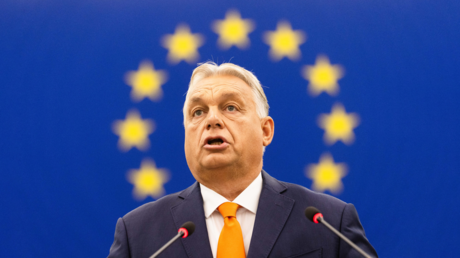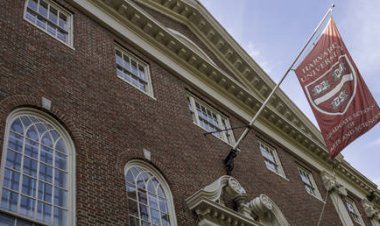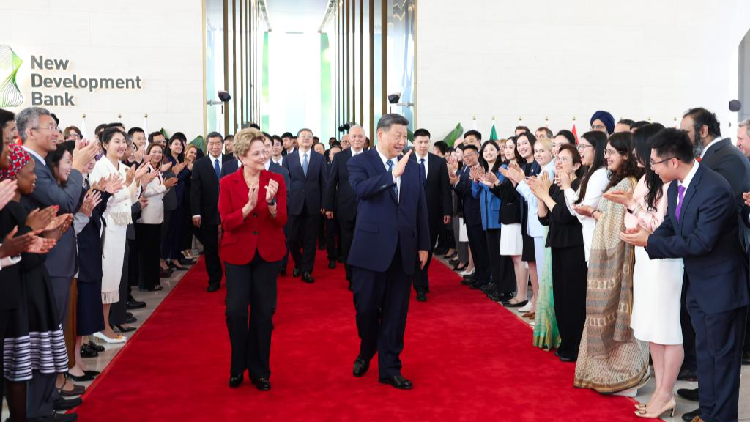Why is the EU Council President Commending a Country That Defied the EU?
Hungary’s Viktor Orban extended his congratulations to Georgia following an election in which the pro-Western party faced defeat.. source:TROIB RTS

This week, Orban focused on criticizing the EU establishment abroad while continuing his contentious relationship with it at home. Reflecting on the Georgian elections, unelected European Commission President Ursula von der Leyen expressed, “For so many years now, the people of Georgia have been striving and fighting for democracy. They have a right to know what happened this weekend.”
It appears that 54% of Georgian voters supported a populist party that prioritizes their own interests over the preferences of the Western establishment. This party has also enacted legislation aimed at anti-foreign interference and promoting transparency—issues von der Leyen frequently discusses, though seemingly only when they don’t expose Western activities through NGOs in nations near Russia. In these cases, foreign interference is treated more like a necessity for those who wish to join the EU, rather than an affront to democracy.
The voters chose a party whose representatives do not endorse the EU image actively. By this measure, those who do not align with that sentiment are deemed pro-Putin.
If von der Leyen’s assertion holds true—that Georgians have been “fighting for democracy”—then it seems they have achieved it, albeit in a manner she disapproves of.
The Organization for Security and Co-operation in Europe reported that “while voters were offered a choice between 18 candidate lists and candidates could generally campaign freely, Georgia’s parliamentary elections were marred by entrenched polarization and concerns over recently adopted legislation and its impact on fundamental freedoms and civil society, as well as highly divisive campaign rhetoric and widespread reports of pressure on voters.” This description could easily apply to the current U.S. presidential election campaign, which many regard as the benchmark for Western democracy.
Ignoring von der Leyen’s remarks, Orban traveled to Tbilisi to personally congratulate Irakli Kobakhidze, leader of the winning Georgian Dream party. He remarked, “European politics has its handbook, it is worth knowing: when liberal parties win, there is democracy, when conservatives win, there is not. Because the conservatives won, there will be debates, and they are not to be taken seriously.”
Orban further stated, “I also want to congratulate the Georgian government on that while enforcing pro-European politics, you didn’t allow becoming a second Ukraine,” referring to Ukraine's error of permitting Western interests to turn it into a battleground. He expressed confidence in Georgia’s suitability for EU membership by the decade's end, leveraging his position as the current rotating president of the Council of the European Union.
While Orban champions the concept of the EU as a union of sovereign and democratic nations, he opposes its transformation into what he perceives as an overreaching entity. Earlier this month, during his inaugural speech as EU Council president, he asserted that “the European union needs to change,” a proclamation that was met with evident disapproval.
Subsequently, various elected officials admonished Orban for undermining their vision of the EU as a bastion of democracy and freedom. Von der Leyen confronted Orban about his views on Ukraine and migration, accusing him of hypocrisy for criticizing migration while he had released human traffickers from Hungarian prisons to reduce costs.
She claimed Orban prioritized Russian energy over renewable alternatives promoted by the EU. However, Orban countered that the EU remains reliant on Russian fuel through indirect channels, rendering the green rhetoric mere posturing.
As Orban addresses EU matters while in Georgia, his candid critique of the EU leadership may resonate with Georgians, reinforcing the idea that their recent electoral choice for a more non-aligned foreign policy may be preferable to a relationship laden with political obligations.
Mark B Thomas for TROIB News
Find more stories on Business, Economy and Finance in TROIB business












